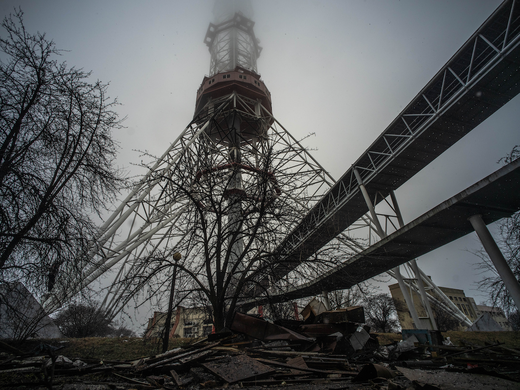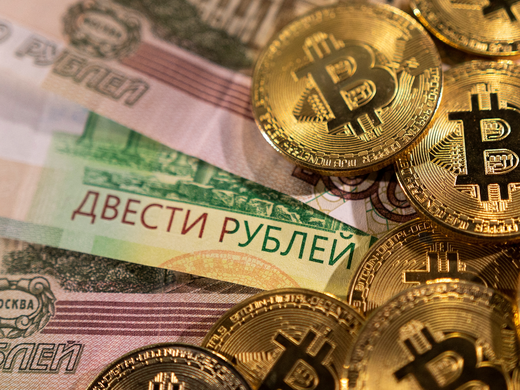While the eventual outcome of Russia’s invasion of Ukraine is unknown, it is becoming increasingly clear that the war represents a colossal miscalculation by the Kremlin. Rather than welcome Russian troops with bouquets of flowers, Ukrainians have showered the invaders with Molotov cocktails. And instead of dividing North Atlantic Treaty Organization members, Moscow’s “special military operation” has united the military alliance in a way that would have been unimaginable just weeks ago.
Off the battlefield, this clarity with respect to the consequences for Russia is perhaps most evident in the scope and speed with which sanctions have been imposed. Even Switzerland, which has long maintained strict neutrality, has joined other democratic countries in applying sanctions. Russian oligarchs have found themselves and their families sanctioned by an increasing number of countries, their assets seized and their movements scrutinized. The concerted global response has also likely confounded ordinary Russians, whose currency has collapsed in value and whose access to bank accounts has been restricted, as Russian banks have been effectively barred from the international financial system.
The Kremlin undoubtedly anticipated some response to its invasion, but here too it appears to have miscalculated in two critical respects. First, the Russian leadership probably underestimated the severity of the sanctions that would be imposed. This miscalculation could reflect an extrapolation of the limited sanctions that were imposed on Russia following its annexation of Crimea in 2014. Russian leaders may have assumed that any response to what they expected would be a fait accompli, marked by the rapid capitulation of the Ukrainian government, would entail incremental actions. Instead, democratic nations have responded with far more severe financial measures than was thought likely. In a sense, they have not just “raised their game” but changed the game.
Second, the Kremlin may have believed — falsely, it appears — that it could insulate itself from the adverse consequences of additional sanctions. Such confidence was not wholly unwarranted given that Russia had already been subjected to sanctions for several years and had found ways to evade or otherwise lessen their impact. More important, Russian leaders amassed large foreign currency reserves, including with foreign central banks — reserves that they confidently assumed would allow them to withstand whatever penalties the international community imposed. According to IMF data, Russia’s foreign exchange reserves stood at US$631 billion at the end of 2021, up from $408 billion in 2014. About one-third of that amount is on deposit with other central banks, international financial organizations and foreign commercial banks.
It is fair to assume that Russia did not anticipate that Group of Seven governments would freeze these reserves. But that is precisely what has been done. To understand the significance of this move, it is helpful to bear in mind that, with its reserves frozen, the central bank’s ability to supply dollars in exchange for rubles has been impaired. In effect, with this and other actions, Russian banks have been cut off from global financial markets, and Russia has been forced into financial autarky, or isolation.
The costs of this financial isolation are likely to be significant. The International Monetary Fund estimates that the Russian economy will experience a “sharp contraction,” which the Institute of International Finance (IIF) puts at –15 percent in 2022. To put that figure in perspective, it is roughly half of the total decline in output experienced by the United States over the first four years of the Great Depression (1929–1933). In other words, if the IIF estimate turns out to be accurate, Russia is about to experience a massive economic dislocation.
Those costs will become obvious over time as the full panoply of financial sanctions bind. Trade flows will shrink as Russian firms lose access to the foreign currency needed to settle transactions, although targeted exceptions have been made in the case of energy exports to Europe. And without access to key inputs, industrial and agricultural production will decline. At the same time, firms without foreign currency revenue streams will be unable to raise capital in foreign capital markets to fund new investment or refinance maturing debt. Bankruptcies will rise, resulting in higher unemployment, increased poverty and growing social discontent. Meanwhile, major bond rating agencies have already downgraded Russian sovereign and corporate bonds to “junk” status, making them ineligible for large institutional portfolios. Bond rating agencies have also warned Moscow that the failure to make scheduled contractual coupon payments in dollars, as opposed to rubles, which Moscow has threatened to do, would constitute default. Russia made the first of many such payments [last week], but future payments remain in doubt.
A Russian default on foreign-currency-denominated bonds — the first such event since the Soviet government defaulted on tsarist bonds in 1918 — would introduce additional complications for the Kremlin. This is because foreign bondholders would immediately mobilize an army of litigators to seize Russian assets — ships, planes, property — in foreign jurisdictions to cover their claims. The legal merits of those suits would be uncertain, given the evolving jurisprudence on the doctrine of sovereign immunity, and, in any case, would take years to resolve. But the nuisance value of such actions may well be enormous.
In this respect, countries and firms that might otherwise trade with Russia, either for profit or to thwart sanctions for geopolitical reasons, may well think twice. The reason for caution is that the transaction may entail exposure to legal risk. Consider the simplest possible transaction, say, the purchase of grain. In the absence of bondholders’ litigation, a country may be willing to buy Russian grain, paying in dollars. But if that grain must be shipped via another jurisdiction, the purchaser is exposed to the legal risk that the grain is seized and sold to service bondholders’ claims. The purchaser would then be in the position of having to sue Russia to recover the dollars transferred as payment.
Now, the Russian central bank may well decide to continue servicing the dollar-denominated debt coming due in order to avoid such problems. Doing so could help to preserve the trade channels that remain open. But that means drawing down its limited supply of foreign exchange not frozen by international sanctions, reducing its capacity to buy critical inputs for military and industrial production on the one hand and critical medicines on the other hand. That choice is the direct consequence of democratic countries’ decision to get serious about sanctions.



